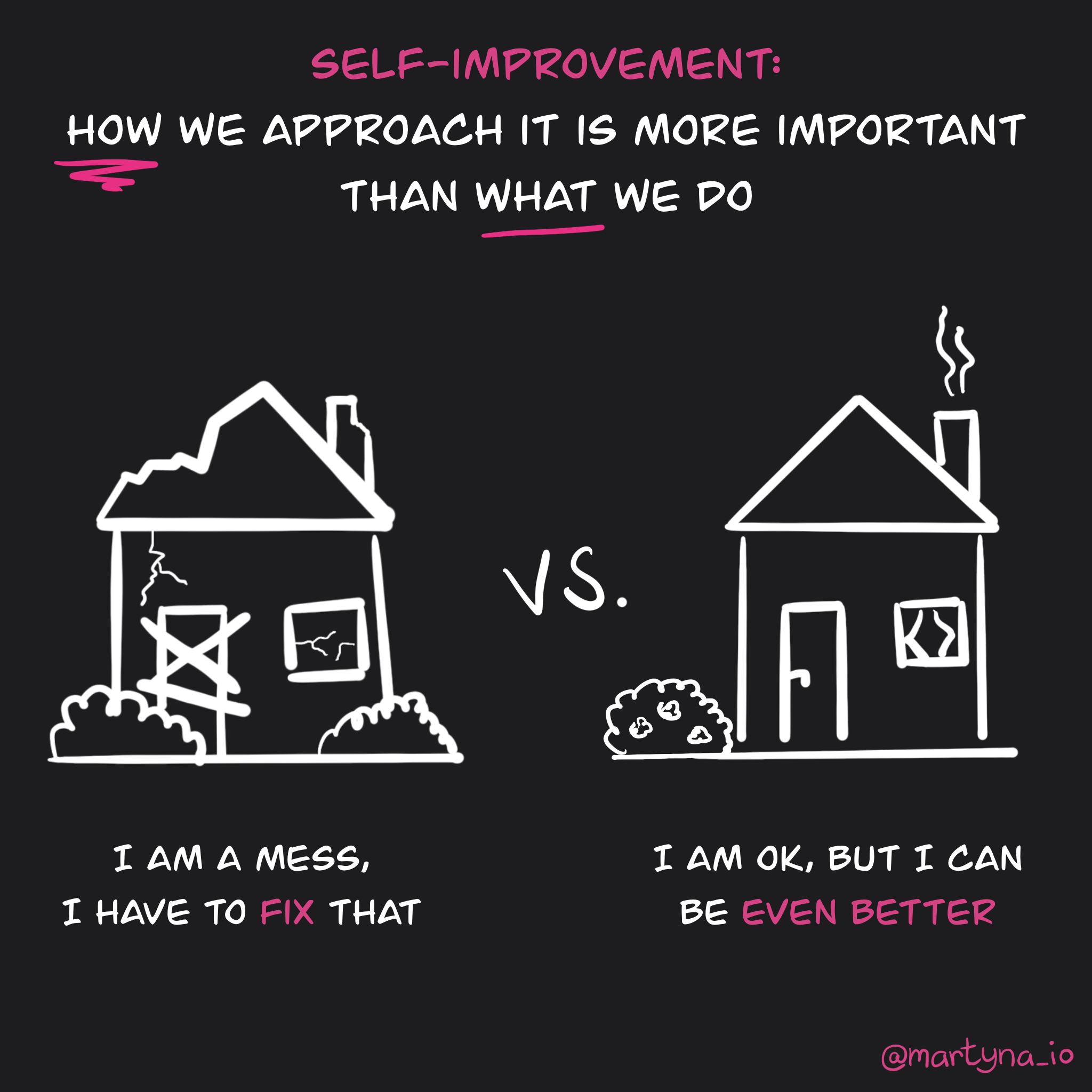The Problem with Self-Improvement
Personal development advice promises an increased life-satisfaction, but in reality our efforts in this direction often only make us feel worse. But there is hope.

Trying to improve your circumstances is only natural and inherently human. And it is a positive thing, right? What's the problem with working hard to better yourself and have a nicer life? Most of us could lose some pounds, learn a new skill, get a higher-paying job, etc. We tell ourselves we would be happier if we did. And it's probably even true to some extent.
So naturally the demand for self-improvement tips is really high. The internet is full of advice on how to reach your goals and what you should do to become a better person (the search terms "self-improvement" yields around 1.2 billion results on Google). Nevertheless, our attempts at self-improvement don't seem to be that successful. For example: did you come up with any New Year's resolutions for 2022? And if the answer is "yes" - how did it go so far? If you're like most people, the chances are there is not much left of the lofty goals you set for yourself. Research shows that 80% of people stick to their new habit for one week, but only 19% make it through 2 years.
How self-improvement makes us feel worse
I have been on a self-improvement or self-development journey myself for the past couple of years. Basically, after I finished college, I had achieved the biggest goal in my young life - getting an education and a job. The joy and feeling of accomplishment quickly subsided though and what emerged was a feeling of being lost at sea. I asked myself: what's next? I didn't have a clear goal anymore, so I turned to the self-development isle in the book stores and focused on trying to improve my productivity and basically every aspect of my life. I established a morning routine, I started to track habits, I wondered about the meaning of life, dabbled with philosophy, thought about what to do with my career and so on and so forth.
And if you look at the metrics of my life over time you would probably indeed say it had improved. But somehow it didn't really feel that much better. Instead, I felt more stressed than ever and - worst of all - couldn't enjoy my leisure time that much anymore, because it felt like I was wasting my time and not being productive enough if I just watched a movie or listened to a podcast instead of "investing in myself". That's when I came across the book Four Thousand Weeks by Oliver Burkeman, where he observes:
We have [...] a deeply bizarre idea of what it means to spend your time off ‘well’ – and, conversely, what counts as wasting it. In this view of time, anything that doesn’t create some form of value for the future is, by definition, mere idleness. Rest is permissible, but only for the purposes of recuperation for work, or perhaps for some other form of self-improvement.
Burkeman then goes on to propose that the only way to not waste your time is to spend at least some of it "wastefully" with the only focus being the pleasure of the experience. And that "[i]n order to most fully inhabit the only life you ever get, you have to refrain from using every spare hour for personal growth."
This reminded me a lot of mindfulness practice and being present in each moment, engaging with it fully, instead of constantly thinking about the past or planning for the future. Because the moment that life is happening is always now. So what are we actually trying to improve with our self-development efforts? Is it really a good idea to always be optimizing for some point in the future or wouldn't it be more helpful if we started to enjoy the present moment? Because in the end it is the sum of all those little moments that make up our lives.
Why self-improvement alone will never lead to life-satisfaction
But I still struggled to let go of my self-improvement and productivity mindset. I surely cannot spend all of my days enjoying the moment, right? The rent doesn't pay itself... That's where my reading of Bruce Tift's "Already Free" comes in. There he argues, that to be satisfied with our lives, we need to feel free and "from the Buddhist point of view, self-improvement is never going to give rise to freedom. It’s only going to give rise to an improved display of our experiencing." This sounds a little confusing at first so let me explain: if you focus solely on self-improvement you may get healthier and smarter and richer. Your life will look better. But true freedom and life satisfaction is not about optics, it's a state of mind.
So this really struck me as it shatters the illusion of achieving happiness and contentment by living a picture-perfect life. Life is messy and we will always be faced with positive and negative experiences, the occurrence of which we have no power over. We can't fully control most of what happens to us, like natural disasters, losing our jobs through recessions, our spouses leaving us, etc. So, to truly become free, we shouldn't focus so much on what we are experiencing, but how we relate to it. You can be rich and miserable and poor and content.
So where do we go from here?
At a later point in the book, Tift asks:
“What would it be like if this is it, if life never gets any better than it is at this moment?” Again, the point of the question is to watch our emotional response. What would it be like to be completely committed to this present reality? Because, in fact, that’s all there is to experience right now, even if it doesn’t match up to our preferred conditions.
This is a very powerful question. Thinking about it, you might realize that there are in fact things that definitely need to be changed in your life - but maybe not the ones you first thought? Or you might see that your life is actually quite ok the way it is and it wouldn't be that bad if it just went on like that.
And that is how my perspective on self-improvement has shifted. It has changed from something that I have to do in order to become happy at some point later in the future, to something that I want to do. You and your life is not something that is inherently broken and needs to be fixed, but something that is workable. If we accept our messy human lives the way they are, we can look at self-improvement as a kind of game. Then it will also become easier to stick to new goals and habits, because you don't view them as chores anymore, but something that brings joy and pleasure.
TL;DR: It is important with which attitude you approach self-improvement or self-development.
- If it comes from a place of thinking that something about you is wrong and needs to be fixed, you will never be satisfied.
- If it comes from a place of being ok with yourself and you're trying to improve something that is already whole, you will be much more content with your journey.
